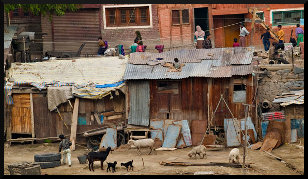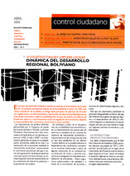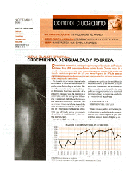anakin.paullier.net newsletter
|
Published on Wed, 2009-09-30 15:06
• Dinámica del desarrollo regional boliviano: vicios estructurales y ¿virtudes locales? • Presupuesto General de la Nación 2001: El espejo de nuestra fragilidad fiscal. • Dilemas del servicio de salud en La Paz y en El Alto. • Informe Social Watch 2001: Impacto social de la globalización en el mundo.
» |
|
Published on Wed, 2009-09-30 15:02
• Dilemas del Ajuste: las inequidades del modelo
• Desempleo ilustrado: los desencantos de la política social
• EBRP: una estrategia que camina a tropiezos
» |
|
Published on Tue, 2009-09-29 11:33
The Social Watch report 2009 was launched Friday, September 25, 2009 at the United Nations Plaza in New York. This year's Social Watch report from over sixty civil society organizations around the world, entitled People First, shows that the only way out of the current ecological and economic crisis is to devote resources to strengthening people's wellbeing. The launch was co-sponsored by NGLS, Amnesty International, Social Watch, Friedrich-Ebert-Stiftung and the Global Policy Forum. |
|
Published on Tue, 2009-09-22 08:48
SEPTEMBER 23, 2009 (PITTSBURGH, USA): The two major South-based international civil society networks Social Watch and Third World Network have jointly called on G-20 leaders to address and pledge to greater social and development investment and to enact a more thorough restructuring of the international financial institutions (IFIs). A deeper commitment to address social inequities and the asymmetric structures of IFIs is the most effective way to mitigate the dramatic social impacts of the current economic crisis and prevent future shocks. These networks, representing grassroots organizations in over 70 countries, will present their policy recommendations today September 23 at 12 noon at the Pittsburgh Renaissance Hotel (107 6th Street) in the run-up to the G-20 summit. |
|
Published on Fri, 2009-09-18 14:15
Social investment is the key to a just and effective solution to the current economic crisis, says citizens' alternative report PITTSBURGH, USA (September 23): Robust social investment programs should be enacted in order to effectively stimulate the global economy and mitigate the impacts of the financial crisis on workers, women and the poor, concludes the international civil society network Social Watch in its 2009 Report. This will not only satisfy criteria of social justice but also is sound economic policy, states the Report, titled People First. The report will be launched today, September 23 at 12 noon at the Pittsburgh Renaissance Hotel (107 6th Street) in the run-up to the G-20 summit. People First includes dozens of in-depth reports from grassroots civil society organizations, which prove that the poorest countries played no part in causing the crisis, yet they are experiencing its worst effects. The exclusion of these countries from forums such as the G-20 creates a further obstacle to implementing socially just policies. |
Published on Thu, 2009-09-17 14:08
 It is now impossible to deny the existence of the causes and consequences of climate change, as the impacts that this phenomenon has produced for the planet and its inhabitants are unmistakeable. Droughts, floods and other rapidly escalating natural disasters principally affect those who are already in situations of poverty and social exclusion. |
Published on Thu, 2009-09-17 14:04
 Since June 28, Honduras has been immersed in a deep political crisis, which was the day in which the Armed Forces – backed by right-wing political parties, the business sector, the Supreme Court, the Catholic Church, and the majority of the mass media – committed a coup d´etat against the elected President Manuel Zelaya. At the moment that the coup d´etat took place, President Zelaya had an approval rating of close to 60%. |
Published on Thu, 2009-09-17 13:51
 From June 24-26, 2009, the historic UN Conference on the Financial and Economic Crisis and its Impacts on Development took place in New York, marking the first opportunity since the global implosion of the financial markets in September of 2008 in which all countries - notwithstanding their geopolitical importance or size of their economies - could participate in the search for a global solution to what is truly a global crisis. |
|
Published on Wed, 2009-07-01 15:37
The network’s operation is run by the International Secretariat, based in the Third World Institute (Instituto del Tercer Mundo - ITeM), Montevideo, Uruguay. The secretariat keeps the communication among members flowing and compiles the national reports by the members to bring them to the attention of the United Nations and otherwise facilitates the members' efforts to make their governments and the multilateral system accountable. |
|
Published on Thu, 2009-03-19 11:40
In crucial times, “Making anti-poverty and gender policies accountable to citizens”, the new project involving the European Commission (EC), Oxfam Novib and Social Watch, aims at further invigorating the reach of the network. |
SUSCRIBE TO OUR NEWSLETTER




